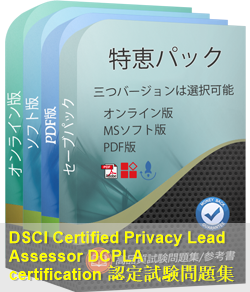コースの簡単な紹介
ほとんどのユーザーにとって、関連する資格試験へのアクセスが最初であるかもしれないので、資格試験に関連するコース内容の多くは複雑で難解です。 これらの無知な初心者によれば、DCPLA試験問題は読みやすく、対応する例と同時に説明する一連の基本コースを設定し、DSCI Certified Privacy Lead Assessor DCPLA certification試験問題でユーザーが見つけることができるようにしました 実生活と学んだ知識の実際の利用に対応し、ユーザーと記憶の理解を深めました。 シンプルなテキストメッセージは、カラフルなストーリーや写真の美しさを上げるに値する、DCPLAテストガイドを初心者のためのゼロの基準に合うようにし、リラックスした幸せな雰囲気の中でより役立つ知識を習得します。 団結の状態を達成するために。
真のシミュレーション環境
多くのユーザーが最初に試験に参加しているので、上記の試験と試験時間の分布は確かな経験を欠いており、したがって試験場所で混乱しがちであるため、つかむ時間は結局試験を完全に終わらせなかった。 この現象の発生を避けるために、DSCI Certified Privacy Lead Assessor DCPLA certification試験問題は各試験シミュレーションテスト環境に対応する製品を持ち、ユーザーはプラットフォーム上の自分のアカウントにログオンし、同時に試験シミュレーションに参加したいものを選択します。DCPLA試験問題は自動的にユーザーが実際のテスト環境のシミュレーションテストシステムと同じように提示され、ソフトウェア内蔵のタイマー機能は体系的な達成するために、ユーザーが時間をかけてより良い制御を助けることができます。DCPLAテストガイドを使って問題を横から解決するためにユーザーのスピードを向上させるためにも。
簡潔な内容
分析後のすべての種類の試験の暦年に基づくエキスパートによるDCPLA試験問題、それは開発動向に焦点を当てた試験論文に適合し、そしてあなたが直面するあらゆる種類の困難を要約し、ユーザーレビューを強調する 知識の内容を習得する必要があります。 そして他の教育プラットフォームとは異なり、DSCI Certified Privacy Lead Assessor DCPLA certification試験問題は暦年試験問題の主な内容が長い時間の形式でユーザーの前に表示されていないが、できるだけ簡潔で目立つテキストで概説されていますDCPLAテストガイドは、今年の予測トレンドの命題を正確かつ正確に表現しており、トピックデザインのシミュレーションを通して細心の注意を払っています。
私たちのDSCI Certified Privacy Lead Assessor DCPLA certification研究問題は質が高いです。 それでテストの準備をするためのすべての効果的で中心的な習慣があります。 私たちの職業的能力により、DCPLA試験問題を編集するのに必要なテストポイントに同意することができます。 それはあなたの難しさを解決するための試験の中心を指しています。 最も重要なメッセージに対するDCPLAテストガイドの質問と回答の最小数で、すべてのユーザーが簡単に効率的な学習を行えるようにし、余分な負担を増やさずに、最後にDCPLA試験問題にユーザーがすぐに試験合格できるようにします。
DSCI Certified Privacy Lead Assessor DCPLA certification 認定 DCPLA 試験問題:
1. FILL BLANK
RCI and PCM
In April 2011, the rules were issued under Section 43A of the IT Act by the Government of India and the
'body corporates' were required to comply with these rules. The Corporate legal team tried to understand and interpret the rules but struggled to understand its applicability esp. to client relationships and business functions. So, the company hired an IT Act legal expert to advise them on the Section 43A rules.
To start with, the company identified the PI dealt with by business functions as part of the earlier visibility exercise, but it wanted to reassure itself. Therefore, a specific exercise was conducted to revisit 'sensitive personal information' dealt by business functions. It was realized that the company collects lot of SPI of its employees and therefore 'reasonable security practices' need to be adhered to by the functions that deal with SPI. It was also ascertained that many of this SPI is being dealt by third parties, some of which are also located outside India. To meet the requirements of the rules, the company reviewed all the contracts and inserted a clause - 'the service provider shall implement reasonable security practices and procedures as per the IT (Amendment) Act, 2008'. Some of the large service providers were ISO 27001 certified and they claimed that they fulfill the requirements of 'reasonable security practices'. However, some SME service providers did not understand what would 'reasonable security practices' imply and requested the company to clarify, which referred them to Rule 8 of the Section 43A. Some small scale service providers expressed their unwillingness to get ISO certified, given the costs involved.
(Note: Candidates are requested to make and state assumptions wherever appropriate to reach a definitive conclusion) Introduction and Background XYZ is a major India based IT and Business Process Management (BPM) service provider listed at BSE and NSE. It has more than 1.5 lakh employees operating in 100 offices across 30 countries. It serves more than 500 clients across industry verticals - BFSI, Retail, Government, Healthcare, Telecom among others in Americas, Europe, Asia-Pacific, Middle East and Africa. The company provides IT services including application development and maintenance, IT Infrastructure management, consulting, among others. It also offers IT products mainly for its BFSI customers.
The company is witnessing phenomenal growth in the BPM services over last few years including Finance & Accounting including credit card processing, Payroll processing, Customer support, Legal Process Outsourcing, among others and has rolled out platform based services. Most of the company's revenue comes from the US from the BFSI sector. In order to diversify its portfolio, the company is looking to expand its operations in Europe. India, too has attracted company's attention given the phenomenal increase in domestic IT spend esp. by the government through various large scale IT projects. The company is also very aggressive in the cloud and mobility space, with a strong focus on delivery of cloud services. When it comes to expanding operations in Europe, company is facing difficulties in realizing the full potential of the market because of privacy related concerns of the clients arising from the stringent regulatory requirements based on EU General Data Protection Regulation (EU GDPR).
To get better access to this market, the company decided to invest in privacy, so that it is able to provide increased assurance to potential clients in the EU and this will also benefit its US operations because privacy concerns are also on rise in the US. It will also help company leverage outsourcing opportunities in the Healthcare sector in the US which would involve protection of sensitive medical records of the US citizens.
The company believes that privacy will also be a key differentiator in the cloud business going forward. In short, privacy was taken up as a strategic initiative in the company in early 2011.
Since XYZ had an internal consulting arm, it assigned the responsibility of designing and implementing an enterprise wide privacy program to the consulting arm. The consulting arm had very good expertise in information security consulting but had limited expertise in the privacy domain. The project was to be driven by CIO's office, in close consultation with the Corporate Information Security and Legal functions.
Did the company take sufficient steps to protect SPI dealt by its service providers and ensure that it complies with the regulatory requirements? Was referring to 'reasonable security practices' sufficient in the contracts or the company should have also considered some other measures for privacy protection as well? (250 to 500 words)
2. Which of the following mechanisms can be used to transfer personal data outside of a country?
A) Adequacy decision
B) Standard contractual clauses
C) Binding corporate rules
D) All of the above
3. Which of the following are classified as Sensitive Personal Data or Information under Section 43A of ITAA, 2008? (Choose all that apply.)
A) Financial information
B) Caste and religious beliefs
C) Password
D) Medical records and history
E) Sexual orientation
F) Biometric information
4. There are several privacy incidents reported in an organization. The organization plans to analyze and learn from these incidents. Which privacy practice will the organization have to implement for the same?
A) Privacy contract management
B) Privacy monitoring and incident management
C) Privacy awareness and training
D) Information usage and access
5. With respect to privacy monitoring and incident management process, which of the following should be a part of a standard incident handling process?
I) Incident identification and notification
II) Investigation and remediation
III) Root cause analysis
IV) User awareness training on how to report incidents
A) I and II
B) All of the Above
C) I, II and III
D) III and IV
質問と回答:
| 質問 # 1 正解: メンバーにのみ表示されます | 質問 # 2 正解: D | 質問 # 3 正解: A、D、E、F | 質問 # 4 正解: B | 質問 # 5 正解: B |


 398 お客様のコメント
398 お客様のコメント





